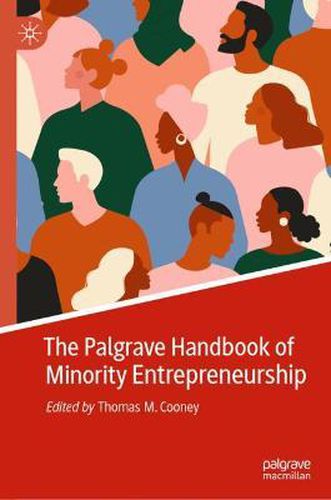Readings Newsletter
Become a Readings Member to make your shopping experience even easier.
Sign in or sign up for free!
You’re not far away from qualifying for FREE standard shipping within Australia
You’ve qualified for FREE standard shipping within Australia
The cart is loading…






This title is printed to order. This book may have been self-published. If so, we cannot guarantee the quality of the content. In the main most books will have gone through the editing process however some may not. We therefore suggest that you be aware of this before ordering this book. If in doubt check either the author or publisher’s details as we are unable to accept any returns unless they are faulty. Please contact us if you have any questions.
Bringing much needed clarity and definition to the term ‘minority entrepreneur,’ this authoritative and timely handbook explores the distinctive challenges that minority communities face when founding and managing new ventures. The handbook is inclusive of any community who might be considered disadvantaged or under-represented in terms of entrepreneurial activity and included are women, youths, seniors, disabled, immigrants, Indigenous peoples, LBGTQ+, ex-offenders, Roma, refugees and many others. Chapters highlight the idiosyncratic nature of the many communities examined before offering frameworks and models that draw together the various findings.
With a cast of international contributors, this scholarly handbook discusses the surrounding literature of minority entrepreneurship and takes an all-encompassing approach to its interpretation. It also addresses the sorely under-researched area of entrepreneurial behaviour among minorities and disadvantaged groups. This is particularly important for policymakers tasked with designing and delivering initiatives that are appropriate for the needs of these communities.
Ultimately this handbook contributes to existing knowledge by:
* providing a current understanding of the literature for each of the communities;
* investigating the uniqueness of the entrepreneurial behaviour within the communities;
* offering new frameworks/models from which future researchers can build new knowledge.
The handbook provides a comprehensive account of an important and fast emerging field of entrepreneurship, and is an invaluable resource for students, researchers and policymakers.
$9.00 standard shipping within Australia
FREE standard shipping within Australia for orders over $100.00
Express & International shipping calculated at checkout
This title is printed to order. This book may have been self-published. If so, we cannot guarantee the quality of the content. In the main most books will have gone through the editing process however some may not. We therefore suggest that you be aware of this before ordering this book. If in doubt check either the author or publisher’s details as we are unable to accept any returns unless they are faulty. Please contact us if you have any questions.
Bringing much needed clarity and definition to the term ‘minority entrepreneur,’ this authoritative and timely handbook explores the distinctive challenges that minority communities face when founding and managing new ventures. The handbook is inclusive of any community who might be considered disadvantaged or under-represented in terms of entrepreneurial activity and included are women, youths, seniors, disabled, immigrants, Indigenous peoples, LBGTQ+, ex-offenders, Roma, refugees and many others. Chapters highlight the idiosyncratic nature of the many communities examined before offering frameworks and models that draw together the various findings.
With a cast of international contributors, this scholarly handbook discusses the surrounding literature of minority entrepreneurship and takes an all-encompassing approach to its interpretation. It also addresses the sorely under-researched area of entrepreneurial behaviour among minorities and disadvantaged groups. This is particularly important for policymakers tasked with designing and delivering initiatives that are appropriate for the needs of these communities.
Ultimately this handbook contributes to existing knowledge by:
* providing a current understanding of the literature for each of the communities;
* investigating the uniqueness of the entrepreneurial behaviour within the communities;
* offering new frameworks/models from which future researchers can build new knowledge.
The handbook provides a comprehensive account of an important and fast emerging field of entrepreneurship, and is an invaluable resource for students, researchers and policymakers.